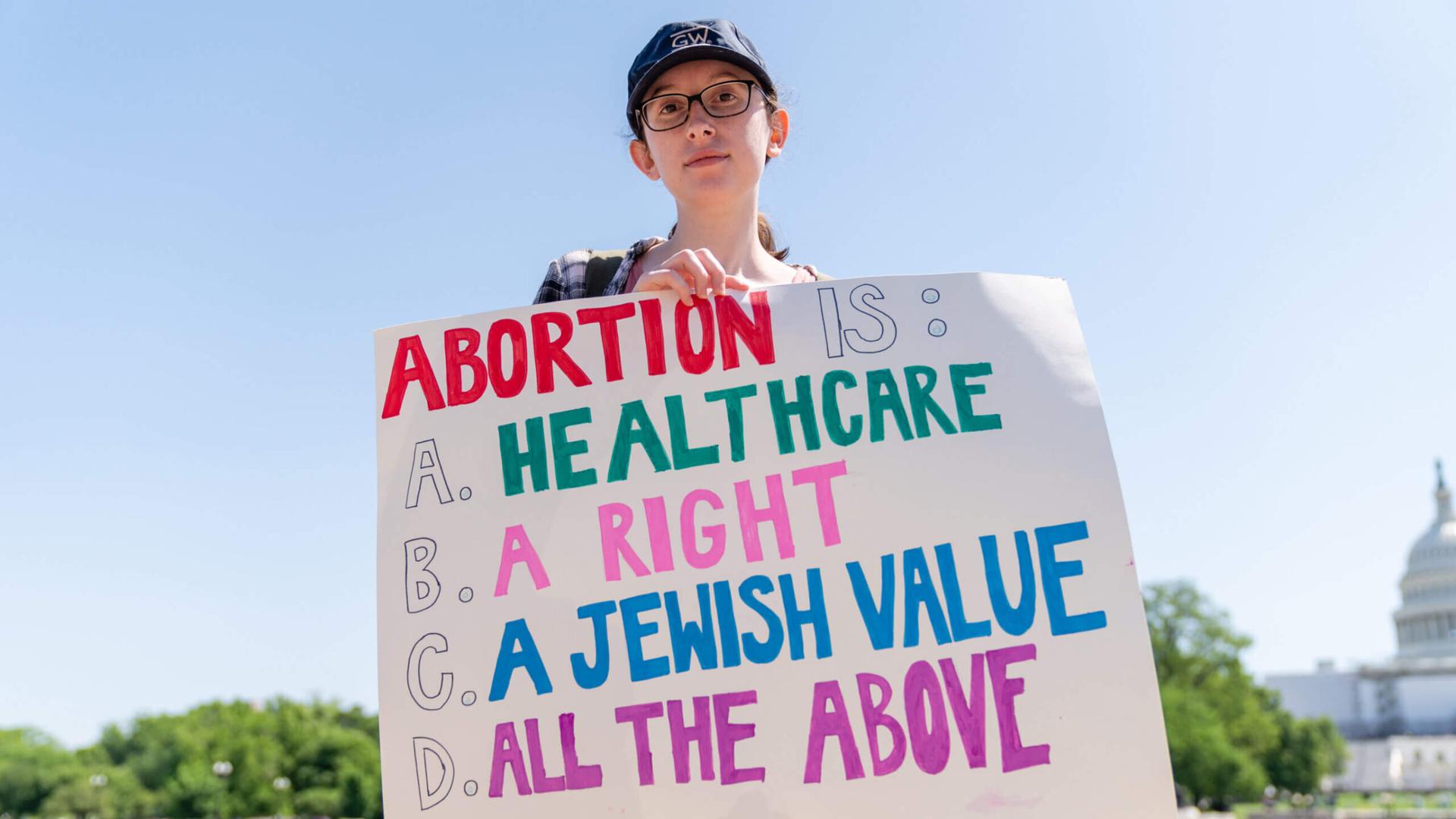In an election year, it’s time to ramp up the fight on abortion rights — and Jewish religious freedom
In honor of Repro Shabbat, a guide to accessing your religious right to an abortion

Graphic by Angelie Zaslavsky
Over the past few years, as abortion rights have become increasingly restricted, and even outright banned, across the country, many anti-abortion activists have cited religion as the backbone of their opposition to reproductive rights. With church groups picketing abortion clinics and religious leaders celebrating the downfall of Roe v. Wade, it’s easy to get the impression that a religious stance on abortion is necessarily an anti-abortion one.
Yet the reality is far more complicated. Because while Christian sects broadly oppose abortion rights, other religions take a different route. And despite the commonly repeated refrain of “Judeo-Christian values,” Judaism’s position on abortion is wildly different from Christianity’s.
Rather than an outright ban, or an insistence that life begins at conception, Judaism offers a complex and nuanced take on abortion, privileging the health and safety of a pregnant person over that of a developing fetus — and, in some cases, even mandating abortion when it is required to save the life or health of a pregnant person. Indeed, in multiple states across the country, Jewish leaders have filed lawsuits arguing that abortion bans violate our religious freedom.
But at the present moment, Jewish religious freedom is far from guaranteed when it comes to abortion access in America. Here’s what you need to know about how to exercise your religious right to an abortion in the U.S. as we gear up for Repro Shabbat 2024:
Abortion laws vary widely across the country.
In the wake of Dobbs v. Jackson, the fate of abortion fell to the states — and America became a patchwork of confusing and conflicting stances on abortion. Depending on where you live, abortion may be significantly more accessible, significantly less accessible, or about the same as it was just two years ago. Plus, it’s not always easy to predict where abortion is or isn’t legal.
Voters have elected to protect abortion rights in conservative states like Ohio and Kansas, and purple states like Pennsylvania can be surprisingly hostile. Notably, there’s a difference between abortion being legal and being accessible: In many states where abortion is technically protected, like Pennsylvania for example, legal restrictions such as mandatory counseling and waiting periods, parental consent for minors and regulatory burdens on providers can make the procedure all but inaccessible.
To know more about abortion laws in your own home state, the Center for Reproductive Rights maintains an up-to-the-minute map of the status of abortion around the country, with a helpful color code to make it clear just how friendly — or unfriendly — each state is to abortion. If you’re looking for an abortion provider specifically, Abortion Finder offers a database of verified providers in your area.
But telemedicine and abortion pills have expanded access all the same.
In the pre-Roe era, an underground abortion often meant an unsafe abortion, with many people forced to turn to shady providers and dangerous alternative methods. But thanks to medical advances, that’s no longer the case. Two abortion pills debuted in the late 20th century — mifepristone and misoprostol — are highly effective, incredibly safe and easy for pregnant people to use by themselves in the privacy of their own home.
With the advent of telemedicine, it has become common for people to skip the abortion clinic altogether, turning instead to online abortion providers who prescribe and ship the pills to their home after a brief online consultation.
In the initial months after Roe was overturned, people living in states where abortion was suddenly illegal often had to turn to virtual mailboxes or loved ones in abortion-friendly states in order to get access to abortion pills, since most providers would only ship to addresses in states where abortion was legal. But with the advent of shield laws — laws which protect abortion providers within the state from anti-abortion laws across state lines — a number of providers have bravely stepped up to offer abortion pills in all 50 states. Plan C maintains a comprehensive database of providers of abortion pills in your area, including some who will provide pills before you’re even pregnant, just in case you need them someday.
If you get in trouble, there are people ready and willing to help you.
While an abortion with pills may be a medically safe way of terminating a pregnancy in a state where abortion is criminalized, the legal risks are still very real. Even though it’s medically impossible to distinguish between an abortion with pills and a miscarriage, prosecutors and police have still found ways to harass and imprison people who are suspected of having an illegal abortion.
If you’re worried about the legal risks of self-managed abortion — or if you’ve been investigated or arrested and need legal support — the team at If/When/How: Lawyering For Reproductive Justice are here to help. Through their legal defense fund and legal helpline, they provide crucial financial and legal support to the most impacted victims of abortion bans.
Everything keeps changing — for better and for worse.
For years, people have been working to get out the vote by reminding people that “abortion is on the ballot.” In a post-Dobbs world, that’s not just a saying — it’s the literal truth. Multiple states will have abortion-related initiatives on their ballots this fall; others are debating whether to include some on theirs. And if Donald Trump and the Republicans sweep the 2024 election, a nationwide abortion ban could go from nightmare to reality.
For Jews, protecting abortion isn’t just about politics; it’s a literal matter of freedom of religion. At a moment when things feel particularly precarious for American Jews, the abortion debate is one more reminder that we have to fight to protect our freedom — and that the best way to secure freedom for Jews and Jewish women is by ensuring that everyone has the right to make decisions about their intimate lives all by themselves, without interference from the government.
To contact the author, email [email protected].





















